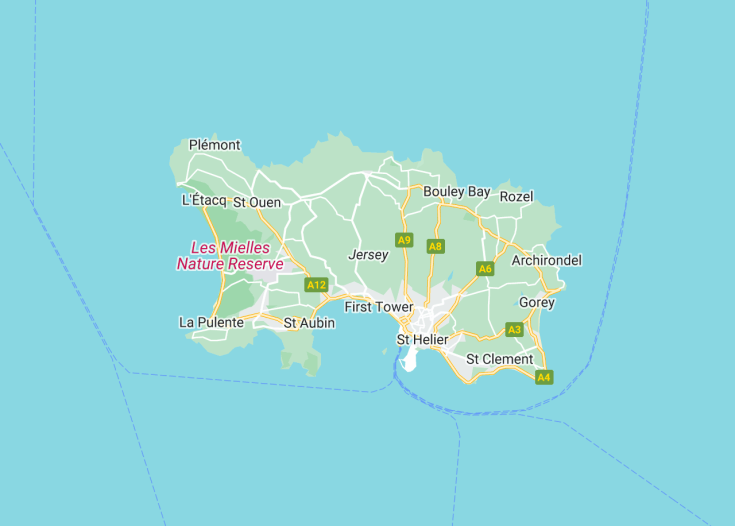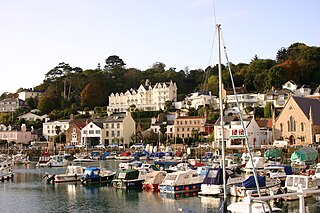Jersey, the largest of the Channel Islands, seamlessly combines British sophistication with French charm. This picturesque island boasts an enchanting blend of sandy beaches, rugged cliffs, and lush countryside. Its rich history, tracing back to Neolithic times, is evident in castles and forts that dot the landscape. St. Helier, the capital, offers a vibrant mix of high-end shopping, delightful restaurants, and fascinating museums, while its coastal paths and inland trails cater to both leisurely strolls and adventurous hikes. Jersey’s unique cultural blend and serene beauty make it a refreshing European escape.
Don’t forget to sample Jersey’s renowned dairy; their ice cream and milk products are exceptionally rich and flavorful.
Visiting the Jersey War Tunnels provides deep insight into the island’s wartime history and its years of German occupation.
Top destinations in Jersey (United Kingdom)
Jersey: an island escape in the United Kingdom
| Capital | Saint Helier |
| Time in Jersey | GMT+0 |
| Language spoken | English and Jèrriais |
| Population | 108,000 (source: States of Jersey, 2021) |
| Religion | Christianity (76%) Other religions (5%) Non-religious (19%) |
| Currency | Jersey pound (£, JEP) |
| Airports | Jersey Airport |
A jewel nestled in the waters of the English Channel, Jersey is the largest of the Channel Islands, boasting a rich tapestry of history and natural beauty. Though geographically closer to France, it’s historically and culturally tied to the British Crown, a unique relationship that has deeply influenced its identity over the centuries.
Traces of its early inhabitants can be found scattered across the island, from the ancient dolmens to the remnants of Roman occupation. Its strategic location meant that it was frequently at the center of battles, most notably during the Second World War when the Nazis occupied it. Today, the Jersey War Tunnels offer a poignant glimpse into the lives of those who endured these challenging times.
Jersey’s landscape is diverse and breathtaking. The rugged coastline offers a combination of sandy beaches and rocky cliffs, while the lush green interior is dotted with quaint villages and historic estates. Coupled with its mild climate, it’s a haven for outdoor enthusiasts, whether they prefer coastal walks, cycling, or simply lounging on the golden sands of St. Brelade’s Bay.
Where is Jersey located?
Jersey is located in the English Channel, just off the northwest coast of France. It’s the largest of the Channel Islands, which are a group of British Crown Dependencies.
What is Jersey famous for?
Jersey is renowned for its scenic coastline, rich history, unique blend of British and French influences, and its world-famous Jersey cow, which produces the acclaimed Jersey milk and cream.
History
Prehistoric Era: Earliest Settlers
Jersey’s history can be traced back to prehistoric times. The island has a rich archaeological heritage, with evidence of Paleolithic hunters and gatherers. The La Cotte de St Brelade cave on the island’s south coast has provided evidence of habitation by Neanderthals, making it one of the oldest sites of human occupation in Europe.
1st-9th Century: Roman Era to Viking Raids
While there’s limited evidence of Roman occupation, Jersey was certainly known to the Romans. Following the collapse of the Roman Empire, the island, much like the other Channel Islands, was exposed to Viking raids. By the end of the 9th century, the Norse influence began to leave its mark, even in the etymology of the island’s name, believed to be derived from the Norse “Geirr’s Island”.
10th-12th Century: Becoming Part of Normandy
During the 10th century, Jersey and the other Channel Islands were annexed by the Duchy of Normandy. This tie to the continent had a profound impact on the island’s culture, language, and governance. The Norman influence can still be felt today, especially in the island’s legal system and in place names.
13th Century: English Rule and The Hundred Years’ War
After the Norman Conquest of 1066, Jersey’s allegiance shifted to the English Crown. When King John lost the continental parts of the Duchy of Normandy to France in 1204, Jersey remained loyal to the English Crown and thus became a frontline defense against French invasion. The island changed hands between the English and the French multiple times during the Hundred Years’ War.
17th-18th Century: Civil Wars and Defense Fortifications
During the English Civil War, Jersey was a stronghold for Royalist supporters, and Charles II even took refuge on the island. Recognizing the island’s strategic importance, the English Crown invested in its defense, building a series of coastal forts, including the iconic Elizabeth Castle.
19th Century: Economic Transformation
In the 19th century, Jersey underwent significant economic changes. The decline of the cider and wool industries led to an agricultural shift, with the island becoming renowned for its dairy cattle and the famous Jersey cow. Additionally, the growth of the English tourism industry brought a wave of visitors to Jersey’s shores, transforming it into a popular tourist destination.
20th Century: German Occupation and Liberation
The most defining event of the 20th century for Jersey was the German occupation during World War II. From 1940 to 1945, the island’s residents experienced significant hardship under Nazi rule. The eventual liberation of the island on May 9, 1945, is commemorated annually as Liberation Day, a significant national holiday in Jersey.
21st Century: Modern Developments and Identity
Into the 21st century, Jersey has maintained its unique blend of British and French influences, balancing its status as a Crown Dependency with its continental heritage. The island has also emerged as a significant financial center. While it grapples with modern challenges, from Brexit implications to global financial pressures, Jersey remains proud of its rich history and distinct identity.
Visit Jersey
What to see and do in Jersey
Jersey offers a range of attractions and activities for visitors to enjoy:
- Explore the stunning coastline and beautiful beaches, such as St. Brelade’s Bay and Plemont Beach.
- Visit the historic castles and forts, including Mont Orgueil Castle and Elizabeth Castle.
- Discover the island’s rich heritage at the Jersey Museum and Art Gallery.
- Experience the vibrant local culture and taste traditional Jersey cuisine, such as Jersey Royals potatoes and Jersey Cream.
- Enjoy outdoor activities like hiking, cycling, and water sports.
Short tile about events in Jersey
Jersey hosts various events throughout the year, offering something for everyone:
– The Jersey International Air Display takes place in September and showcases spectacular aerial performances.
– The Jersey Battle of Flowers Parade, held in August, features intricately decorated floats and floral displays.
– The Jersey Festival of Words celebrates literature and storytelling with talks, workshops, and author events.
Best time to visit Jersey
The best time to visit Jersey is during the summer months from June to August when the weather is warm and the island’s outdoor attractions can be fully enjoyed. However, spring and autumn also offer pleasant weather and are ideal for exploring the island’s natural beauty and cultural sites without the peak tourist crowds. The winter months are quieter but still offer a unique charm, with festive events and cozy pubs to enjoy.
Is Jersey worth visiting?
Jersey is definitely worth a visit for its rich history, stunning landscapes, and vibrant culture. The island offers a unique blend of French and British influences, creating a truly distinctive experience. From exploring ancient castles and beautiful beaches to tasting local delicacies and participating in lively events, Jersey has something to offer for every visitor. The island’s warm hospitality and charming atmosphere make it a delightful destination. However, it’s important to note that Jersey is relatively small and may not have the same level of urban attractions or bustling nightlife as larger cities. Nonetheless, its natural beauty and cultural heritage make it a worthwhile destination for those seeking a peaceful and enriching getaway.
Common questions
What are the top attractions in Jersey?
- Jersey War Tunnels
- Jersey Zoo
- Mont Orgueil Castle
- La Mare Wine Estate and Distillery
- The Elizabeth Castle
- St. Aubin’s Bay
- Jersey Lavender Farm
- St. Helier
- Jersey Museum and Art Gallery
- Corbiere Lighthouse
- Queen’s Valley Reservoir
- Jersey Maritime Museum
What are the best beaches in Jersey?
- St. Brelade’s Bay
- Plemont Bay
- St. Ouen’s Bay
- Grouville Bay
- Green Island Beach
- Archirondel Beach
- Bonnievale Beach
- Grève de Lecq Beach
- Portelet Bay
- Beauport Bay
- La Rocque Beach
- Belcroute Bay
What outdoor activities can I do in Jersey?
- Hiking along the coastal paths
- Surfing in St. Ouen’s Bay
- Kayaking in the pristine waters
- Cycling through scenic routes
- Coasteering along the rugged cliffs
- Stand-up paddleboarding
- Golfing at renowned golf courses
- Parasailing for breathtaking aerial views
- Shopping at local markets
- Visiting the Jersey Lavender Farm
- Enjoying picnics in beautiful parks
- Exploring the countryside on horseback
Where can I try local delicacies in Jersey?
- St. Helier Central Market
- El Tico Beach Cantina
- Sumas Restaurant & Deli
- La Côte Bistro
- Jersey Crab Shack
- Don Giovanni
- The Boat House
- Normandy Inn
- The Oyster Box
- The Hungry Man
- Green Island Restaurant
- Café Poste
What are the best hiking trails in Jersey?
- Jersey Coastal Walk
- North Coast Cliff Path
- L’Etacquerel Fort Walk
- Le Don Hilton Walk
- St. Brelade’s Bay to St. Ouen’s Bay Walk
- St. Catherine’s Woods Walk
- Corbiere Coastal Path
- Les Mielles Nature Reserve and Dunes Trail
- Ouaisné Common and the German Bunker Trail
- St. Helier to St. Aubin’s Bay Walk
- Rozel to Fliquet Bay Walk
- Val de la Mare Reservoir Walk
What is the best time to visit Jersey?
What is the local currency in Jersey?
How do I get around in Jersey?
- Public buses: Jersey’s bus service is extensive and covers most parts of the island.
- Taxis: Taxis are readily available and can be found at taxi ranks or booked in advance.
- Hire cars: Renting a car is a popular option for exploring the island at your own pace.
- Cycling: Jersey has an excellent network of cycle paths, and cycling is a popular way to get around.
- Walking: Many attractions and places of interest are within walking distance, especially in St. Helier.
Are there any water sports activities in Jersey?
- Surfing
- Kayaking
- Paddleboarding
- Jet skiing
- Coasteering
- Sailing
- Windsurfing
- Scuba diving
- Water skiing
Whether you’re a beginner or an experienced water sports enthusiast, there are options available for all levels.
Are there any family-friendly attractions in Jersey?
- Jersey Zoo: A popular zoo with a wide variety of animals to see.
- La Mare Wine Estate and Distillery: Explore the vineyards and indulge in delicious treats.
- Jersey Lavender Farm: Discover the beautiful lavender fields and enjoy family-friendly activities.
- Jersey Bowl: Have a fun-filled day of bowling and arcade games.
- The aMaizin! Adventure Park: Enjoy a range of activities, including a corn maze, go-karts, and farm animals.
- Morokuru Farm: Meet friendly farm animals and enjoy tractor rides.
- Creepy Valley Adventure Centre: Experience adrenaline-pumping activities like ziplining and rope courses.
- Jersey Adventure Golf: Challenge the family to a game of mini-golf.
- Les Mielles Fun Zone: Go-karting, laser tag, and a soft play area await at this family-friendly spot.
- Jersey Pirate Adventures: Embark on an exciting pirate-themed boat trip.
- Tamba Park: Enjoy outdoor play areas, a petting zoo, and mini-golf at this family-friendly park.
- Jersey Bowl Adventure Golf: Play a round of mini-golf in a tropical-themed setting.
Whether your family enjoys wildlife, adventures, or fun-filled activities, Jersey has something for everyone.












